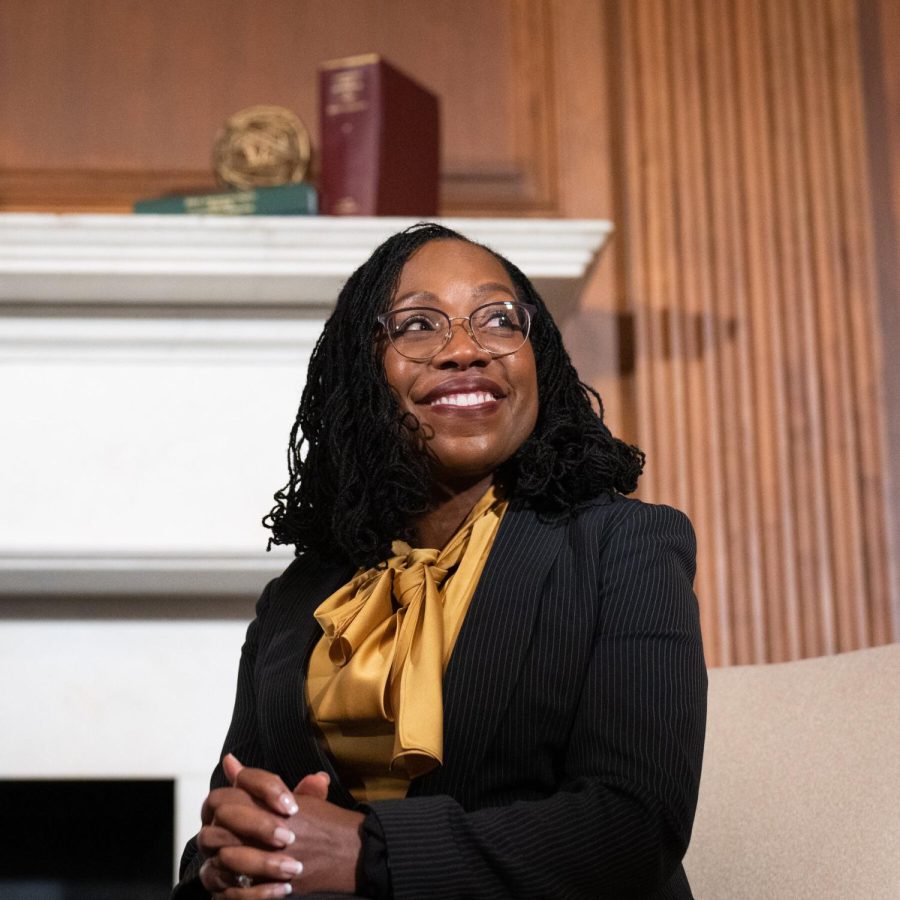“Soft on crime”
Justice nominee Ketanji Brown Jackson is assessed by Senate
Ketanji Brown Jackson will make history as the first black female Supreme Court Justice.
April 7, 2022
U.S District Court Judge Ketanji Brown Jackson was nominated as the next Supreme Court Justice by President Joe Biden in February of this year, and has recently finished her confirmation hearings with the Senate. She had faced an average of 11 hours of questioning from many different Senate members each day alone, regarding a few different topics that trouble America today. Everything you might need to know about Jackson and the hearings can be read below.
The Supreme Court has a different method of instating new judges, or Justices, in comparison to the other branches of government. Instead of candidates running campaigns in hopes of being elected into a position, the president will instead nominate a person who they believe is fit for the position. However, that nominee must also be voted upon by the Senate after a questioning session, known as confirmation hearings, from each of the Senators.
After the retirement of former Justice Stephen G. Brayer, Biden nominated Jackson to be Brayer’s replacement in the U.S. Supreme Court. The Senate began Jackson’s confirmation hearings starting March 21, 2022, with a total of four sessions expanding four days. She sat in a room with senators for a combined total of an estimated 45 hours, roughly 10-12 hours per day.
Over the span of those four days she faced a majority of questions, but the most recurring ones were from the Republican senators who were worried over a collection of cases she handled in her previous role, where she had supposedly leaned away from a standard, lengthy punishment for child pornography. Jackson initially answered to this by saying “[she is] imposing all of those constraints because [she understands] how significant, how damaging, how horrible this crime is.” The questions regarding these cases were in ranging severity, but a notably scorching accusation came from Republican Senator Marsha Blackburn:
“I can only wonder what your hidden agenda is. Is it to let child predators back to the streets?” Blackburn snapped.
Jackson was often dodging the questions about this topic after her initial response, but during the third day of hearings in regard to a question from Senator Josh Hawley about the cases, she fought back.
“Senator, what I regret is that in a hearing about my qualifications to be a justice on the Supreme Court, we’ve spent a lot of time focusing on this small subset of my sentences,” Jackson replied.
A response like this can be up to interpretation by the viewers as either a simple distaste to these harsh questions, or a coverup of something more.
The majority of Democrats did not have many questions to ask. She was met with overwhelming amounts of praise, notably from Democratic Senators Cory Booker (NJ) and Dick Durbin (IL).
“You have earned this spot. You are worthy. You are a great American,” said Booker.
Durbin was a notable figure throughout the hearings, as multiple times he tried to retaliate or topic shift when the previously mentioned cases were brought up. He twice tried to change topics, once to Jackson’s “judicial philosophy,” and again towards a topic involving Guantanamo Bay. He also cut off Senator Ted Cruz during the end of his questioning, causing a chain of back and forth attacks at each other.
After four days of chaotic questions from the Senate, the hearings ended the afternoon of March 24. The Senate is currently in the process of deciding their votes as to whether or not to invite or reject her to the Supreme Court. Although we will not see the results until next month, as this process usually lasts anywhere from 45 to 60 days, it currently appears that she is winning the vote with 43 voting for her and 11 voting against her. The remaining 46 have yet to vote.


